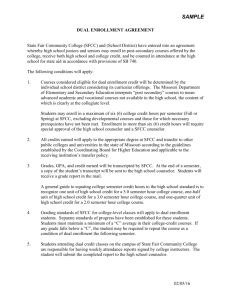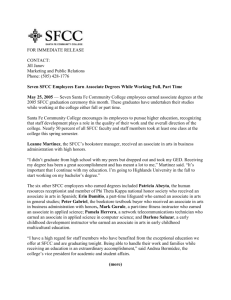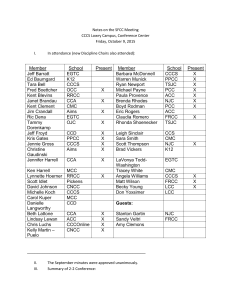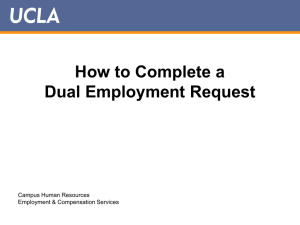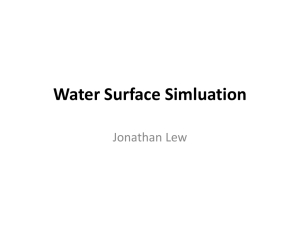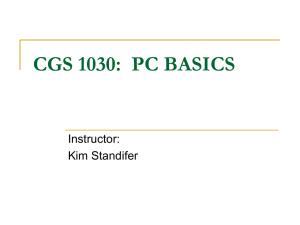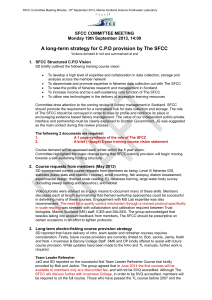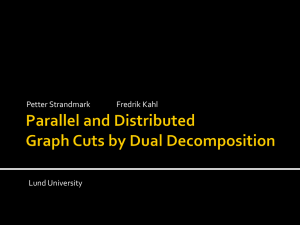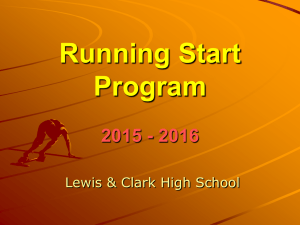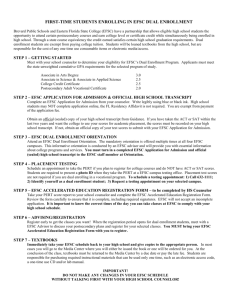How the Payment Plan Works
advertisement
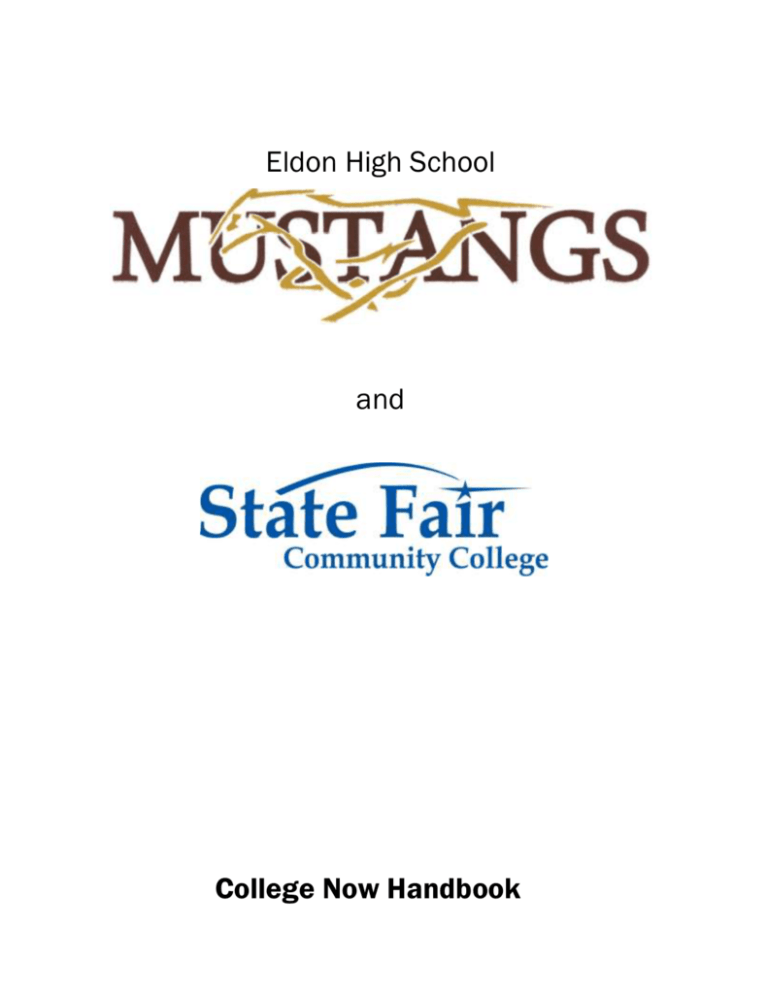
Eldon High School and College Now Handbook Student Eligibility for Dual Credit SFCC follows the College Board of Higher Education’s (CBHE) Policy for the Delivery and Transferability of Credit in Dual Credit Program Offered in High Schools. Student Eligibility: 1. Maintain a high school GPA of 3.0 (on 4.0 scale) 2. Meet the college’s mandatory English, reading, and/or math placement test requirements (score requirements shown under Placement Score Requirements section of this handbook). 3. Be a high school junior or senior (*freshman and sophomores are eligible if they score in the 90th percentile of their ACT Cohort in that subject area) 4. Be recommended by high school principal or designee Enrollment Procedures Student application forms will be provided to the high school counselor or a designee (dual credit instructors sometimes coordinate enrollment of students). You may print additional application forms by going to www.sfccmo.edu/dualcredit, and click on Application. The following items are needed for enrollment: 1. Fully completed student application form including necessary signatures 2. Copy of most recent high school transcript (attached to application) 3. Copy of appropriate placement score (ACT or COMPASS) attached to application 4. Payment for course. SFCC will bill your students’ home address Parents may call the SFCC business office with credit card information toll free at 877-3117322 x 7203. A payment plan is also available for students (see Payment Plan section of this handbook) Due Dates for Enrollment Enrollment paperwork including application, transcript, payment (and test scores if applicable) is due during the first two weeks of high school If an extension is needed, please be sure paperwork is submitted no later than the following: Fall Semester 1st Wednesday in September Spring Semester 2nd Wednesday in January Please note: For students enrolling in classes on an SFCC campus or online, these classes fill up quickly. Students need to schedule an appointment with the Director of Dual Credit by calling 660-596-7379 or 660-596-7306. Students may bring a completed application form with them to the appointment to expedite enrollment. An application form may be copied from the back of this handbook or printed from the dual credit web site: www.sfccmo.edu/dualcredit. Tuition Dual credit students are provided with a reduced tuition/fee rate. Tuition and fees for the 2014-2015 academic year are $73 per credit hour. Online courses and Music courses require an additional fee; please check on these with the Dual Credit Office. Payment Plan Most dual credit students pay tuition via check or credit card. However, these students are also eligible for a payment plan. This is not a loan program. Students have no debt, there are no interest or finance charges assessed, and there is no credit check. The cost to budget the interest-free monthly payment plan is a $25 per semester nonrefundable enrollment fee payable to SFCC via their online e-cashier. Students may budget their tuition and fees in the following way: The monthly plan is for students who do not receive any type of financial aid (Pell grant, loan, scholarship, A+, etc.). The sooner a student who is not receiving financial aid enrolls in the monthly plan, the longer that student will have to pay on his or her account balance, which means the payments will be smaller. How the Payment Plan Works With either payment method below, payments are processed on the 5th of each month and will continue until the balance is paid in full Automatic Bank Payment (ACH)-ACH payments are those payments you have authorized SFCC to process directly with your financial institution. It is simply a bank-to-bank transfer of funds that you have pre-approved for your expenses at State Fair Community College. Payments may be made from either your checking or savings account. Credit Card Option-Paying with your credit card gives you the option of taking advantage of any bonus programs that may be offered by your credit card company. Your monthly payment will be automatically charged to the credit card you designate.. Access to the online Payment Center is through mySTAR. To sign up, follow these steps: (Please note you may need to disable popup blockers on your computer when you enter the Payment Center. For Internet Explorer 7.0 and Mozilla Firefox 3.6 browsers, click "How to Disable Popup Blockers" to view step-by-step instructions. If you have added another toolbar such as Google, Yahoo, MSN, etc., you will need to disable that toolbar to be able to access the Payment Center.) Log in to mySTAR Select the Student tab In the Registration Tools channel, select the Payment Center link Choose the “Enroll in a Payment Plan” tab in the Quick View section Review your account balance and follow the prompts for enrolling Students need to have the following information: Nine-digit student ID number as assigned by State Fair Community College. The name, address, and e-mail address of the person responsible for making the payments Account information for the person responsible for the payment If paying by automatic bank payments, the bank name, telephone number, account number, and the bank routing number will be needed. Most of this information is located on the individual’s check. If paying by credit card, the credit card number and expiration date will be needed. For a complete listing of payment plan enrollment deadlines, please refer to the Web site by logging onto www.sfccmo.edu/paymentplan and scrolling to “Availability.” Contact Information For questions with regard to the payment plan agreement or tuition balance, students should contact the SFCC Business Office at (660) 530-5800, ext. 7209. Placement Score Requirements The college requires assessment and mandatory placement to help students succeed. The placement tests gauge proficiency in English, reading, and mathematics; core skills required in the general education curriculum and technical programs. Placement scores are also required for a number of additional courses at SFCC; please see course listings at http://www.sfccmo.edu/pages/104.asp or reference the end of this document. Class Attendance Regular attendance is essential for college success. Although students are expected to attend all class sessions and report punctually, the instructor determines the attendance requirements for each class. Generally SFCC instructors allow only three absences. Dual credit students are also governed by their respective high school attendance policy. Course Drop / Withdrawal and Refunds Signing up for a dual credit class is a significant decision and should not be taken lightly. The grades earned for a dual credit course are applied to a college GPA and will follow students after high school graduation. Ideally, if a student has carefully considered dual credit and has enrolled in the class, a drop should not be necessary. However, if extenuating circumstances exist, the high school counselor or dual credit instructor should contact the Director of Dual Credit immediately to process the drop/withdrawal. Refunds are not allowed for dual credit classes unless approved by the Vice President for Educational & Student Support Services. To request a refund, the student or parent should write a letter describing the unique circumstance surrounding the drop/withdrawal. Letters may be mailed to: Office of College and Career Readiness, 3201 W. 16th Street, Sedalia, MO 65301 Transcript Request Information An academic record (transcript) is permanently maintained for each dual credit student who registers with State Fair Community College. A written request is required for an official transcript. Neither telephone nor e-mail requests are honored. Requests for official transcripts may be made by mail, by fax, or by completing a request form in person. Please include the following information when requesting an official transcript: - Full name, including any previous names used at SFCC - Your SFCC student ID number or social security number - Date of birth - Approximate dates of attendance at SFCC - Current mailing address and telephone number - The complete mailing address where the transcript is to be mailed or the fax number and to whose attention for a fax - A written signature is required Transcript request forms can be printed by going to www.sfccmo.edu/dualcredit, click on Transcript Request. Once the form is completed, students should mail it to State Fair Community College, Attn: Registrar, 3201 W 16th St., Sedalia, MO 65301 or fax it to the Registrar's Office at (660) 596-7472. Mailed, faxed or picked up transcripts cost $10 and can be paid by cash, check (made out to State Fair Community College), money order, or credit card. Students who would like to pick up a transcript in the Registrar's Office will need to present valid photo identification at the time of pickup. All transcript requests are processed within 48 hours of receiving the request and are ready to mail, fax or be picked up after 4 p.m. Transferability of Credit Most dual credit courses are considered general education classes. Therefore, SFCC has experienced great success with transferring credit at institutions throughout Missouri. Most higher education institutions detail how SFCC credits transfer on their college Web site. Look for the term “Course Equivalencies” when searching for transfer information. In addition, SFCC’s dual credit Web page displays quick links to some Missouri schools’ course equivalencies list. To view these links go to www.sfccmo.edu/dualcredit, click on Transferability. Articulation vs. Dual Credit: What’s the difference? Articulation agreement An articulation agreement is a written, formal document that specifies the process by which a high school student may earn college credit through successful completion of certain high school courses where students achieve learning outcomes, skills and abilities comparable to those covered in a college course. The process allows high school students to move smoothly into postsecondary education without experiencing delay or duplication of courses. The college credit is not awarded until the student is enrolled at the college issuing the articulation agreement. Because the courses involved are at the high school level, the student pays no tuition. Dual Credit Dual credit provides the opportunity for high school students to enroll in courses approved by a postsecondary institution for college credit. The student is able to receive credit toward a high school diploma for such courses and upon graduating from high school receives college credit from the postsecondary institution involved and other colleges and universities, which accept transfer credit from that postsecondary institution. Dual credit courses are generally advanced-level courses and are open to students who qualify for admission for college-level work. The high school student pays a reduced tuition for dual credit courses. In order for the course to meet the dual credit criteria, the postsecondary institution may dictate the textbook, syllabus, grading system, teacher qualifications and other course requirements. Course Descriptions, Plan of Study, & Schedule for Eldon School District ART 101 - Art Appreciation 3 Study of art history from the last of the 19th century through the present. Consists of formal lectures, films, slides, gallery and studio visits, assigned readings, as well as hands-on experiences with art materials. Includes the evolution of art by focusing on the major art movements of the past 100 years. Encourages appreciation of visual art through the study of content, design, technique, and criticism of art. Students learn how art changed during this period and how it reflects the dynamics of 20th century civilization. BADM 101 - Introduction to Business 3 Introduction to the principles, practices and problems encountered in the general business environment. Topics include options for organizing a business, and the basic functions of accounting, marketing, management, and finance. BADM 107 - Personal Finance 3 An introduction to personal financial management. Examines the techniques necessary to analyze and make choices concerning major purchases, tax planning, insurance, borrowing, investing, and other personal finance issues. BIO 112 – Introduction to Biology with Lab 5 Introduction of biology that develops understanding of basic, unifying concepts in science and biology through an investigative laboratory environment. Topics include the scientific method, biochemistry, cell biology, metabolism, genetics, evolution, ecology, and human ecology. (4 lecture, 1 lab) BIO 207 – Human Anatomy w/ Lab 4 Study of gross and microscopic anatomy of the human organs, tissues and systems. (2 lecture, 2 lab) EASC 116 – Environmental Science 3 Introduces environmental concepts and problems. Topics will include basic ecology, human population ecology, natural resources, and pollution. Students will learn how man interacts with his environment. ENGL 101 - English Composition I 3 Emphasizes planning, drafting and revising along with critical thinking and information management skills and their role in communicating concise written ideas to a range of audiences for a variety of purposes. Basic computer skills are essential for successful completion. ENGL 102 - English Composition II 3 Combines the process writing techniques acquired in ENGL 101 with critical reasoning and research skills to emphasize the real-life relevance in the act of managing information. This includes retrieving it from a variety of sources and evaluating, analyzing and combining it with other sources to communicate ideas in meaningful and articulate writing. Basic computer skills are essential for successful completion. HIST 101 - US History Before 1877 3 Survey of the political, economic and social development of the United States from its European origins through the Reconstruction Process. A study of the Missouri Constitution is included to meet the state’s requirements in Senate Bill No. 4. HIST 102 - US History Since 1877 3 Survey of the political, economic, social, and military development of the United States from 1877 to the present. A study of the Missouri Constitution is included to meet the state’s requirements in Senate Bill No. 4. LIT 101 - Introduction to Literature 3 Students will study fiction, poetry and drama. Special attention is given to literary terminology and critical analysis. Recommended but not required as a preparation for other courses in literature. LIT 107 - American Literature 3 Students will thematically study major American authors and works from the Colonial Period to the present, emphasizing development of concepts that have shaped American life and literature. MATH 108 - Technical Math II 3 Topics include signed numbers, formulas, algebraic functions, and trigonometry relationships. Course will stress applications to practical problems as they apply to trade. MATH 112 - Intermediate Algebra 3 Topics include: properties of the real number system, scientific notation, equations and inequalities involving absolute value, graphs of linear equations and inequalities in the plane, systems of equations in two unknowns, rational exponents and radicals, radical equations, imaginary and complex numbers, quadratic equations and inequalities, and conic sections. MUS 101 - Music Appreciation 3 Introductory course concerned with the elements of music, the important musical masterpieces and the significant composers. A portion of the class time is devoted to listening to recordings of selected composers and performers. Not open to music majors. PHIL 101 - Introduction to Philosophy 3 An introduction to the history, persons and perspectives related to the theory of the nature, methods and limits of knowledge. The student will be challenged to deal with concepts such as reality, truth, ethics, reason, and metaphysics. POLS 101 - American/National Government 3 Survey course of the American government and political systems. Particular attention is given to the government’s origins, politics, the branches of government, and policy making. The Missouri Constitution is included to meet the requirements of Senate Bill No. 4. PSY 101 - General Psychology 3 Introduction to the scientific study of behavior and mental processes. Includes a survey of historical and current theories, theorists and perspectives in psychology. Goals include increasing critical thinking and intellectual curiosity about psychological phenomenon and provides a basis for further study in the field. Topics may include: neurology, sensation and perception, consciousness, learning, psychometrics, personality development, and mental illness and wellness. SOC 100 - General Sociology 3 Introduction to the basic principles, concepts, research strategies, and empirical findings representative of the field today. Explores the relationships of individuals and groups in the context of broader social patterns. Establishes a basis for further study in the field. Course topics may include gender and racial inequality, deviance, economic and political institutions, social mobility, and concepts related to current social and cultural change. SPTH 101 - Public Speaking 3 Study and practice of basic techniques involved in generating, designing, delivering, and evaluating ideas for speech situations facing adults of our society. WELL 122 - Applied Wellness 1 A different type of physical education activity class that can be enjoyed by any or all students on campus regardless of age or physical condition. It is designed to provide students with theoretical and practical experiences focusing on the relationship of lifestyle to productivity and quality of life. ECC Course Descriptions Accounting I and II ACCT 109 3 Students will build a basic understanding of accounting principles, concepts and procedures used to operate a business. Learn the accounting cycle: record transactions in journals, post to ledgers and prepare financial statements. Become informed about banking activities, payroll systems and tax preparation. This course introduces Quick Books accounting software. Greenhouse Operation & Management AGRI 129 3 Students will receive instruction on plant and flower identification and growth plants commonly grown in Missouri greenhouses. Units of study include plant growth and development, plant propagation, greenhouse management, growing techniques, insect identification, and careers in the horticulture industry. Students will also participate in the *Supervised Agriculture Experience Program (SAEP) and FFA leadership. Pre-Requisite: Ag. Science I, Recommended: Ag. Science II Landscaping/Turf Management AGRI 151 3 Students enrolled in this class will receive entry level hands-on training in landscaping homes and businesses. Students will also receive training for athletic field and gold course design and maintenance. Students will develop skills in plant identification and recommended plant uses. Instruction includes landscaping and landscape design and plant propagation. Students will also conduct a *Supervised Agriculture Experience Program (SAEP) along with FFA leadership. Prerequisites: Ag. Sci I; Recommended Ag Sci II Agriculture Business Management and Sales AGRI 132 3 This course is designed for students interested in money management and profit maximizing principles. Instruction includes cost analysis, budgets, supply and demand, investment analysis, income tax management, marketing and sales. Students will also learn proper techniques for filling out resumes, applying and interviewing for jobs. Students will also learn to prepare and make a sales presentation. Students will maintain their personal record book on their *Supervised Agriculture Experience Program (SAEP) along with FFA leadership. Prerequisites: Ag. Sci I and II A unit of embedded personal finance will be part of this curriculum. Embedded Personal Finance – this is for students who opt out of taking a semester of Personal Finance. They must take the course for a year and pass a test to receive their Personal Finance credit. Advanced Plant Science – Agronomy AGRI 118 3 This course is designed for the student interested in the growing and tending of plants and also the care and raising of animals. Instruction includes evaluation of grassland, soils and wildlife along with plant identification. The class also includes crop judging, soil surveying, and animal reproduction and nutrition. *Supervised Agriculture Experience Program (SAEP) will be part of this curriculum as well as students developing their FFA leadership skills. Prerequisites: Ag. Sci I and II Advanced Animal Science AGRI 108 3 This course concentrates on the practical application of science-based principles to food animal production. Subjects taught include: breeds of animals, animal reproduction, animal nutrition, animal products, food science, animal health, parturition, small animal management, animal selection, record keeping, and agricultural leadership. Livestock Evaluation will be taught in the spring semester. Each student will receive basic training in record keeping through the development of a *Supervised Agriculture Experience Program (SAEP). In addition, each student will receive training in public speaking and parliamentary procedure as well as be given opportunities to participate in leadership and skill contests. Students will continue to develop their FFA leadership skills. Prerequisites: Ag. Sci I and II Architectural 3D Design I CAD 120 Architectural 3D Design II CAD 125 3Ds Animation I & II CAD 155 3 3 3 3 3 You will use 3ds Max software to visualize in a virtual reality design such as buildings and machines. You will transfer designs created in other programs into 3ds MAX to add lighting and materials then render to still image or movie format. Prepare to be entertained and fascinated by the awesome power at your fingertips. With 3ds Max you can create 3D places and characters, objects and subjects of any type. You can arrange them in settings and environments to build the scenes for your movie or visualization. You can animate the objects and characters, set them in motion, make them speak, sing, and dance or kick and fight. Electronics/Robotics Pending Articulation Agreement Architects design office and apartment buildings, schools, museums, churches, factories, hospitals, houses, and airport terminals. They also design multibuilding complexes, such as urban centers, college campuses, industrial parks, communities, and amusement parks. During this course structures will be visualized, designed and animated. This course relies on the power of Revit Architectural software to create and organize design creations. Prerequisites: Arch. II can not be taken until Arch. I is completed with a grade of C or higher. Recommendations: Geometry and Computer Applications. Mechanical Modeling I CAD 130 Mechanical Modeling II CAD 132 For the mechanically minded, there’s nothing more exciting than watching ideas be transformed from initial thoughts and sketches into 3D models and working prototypes. This course uses Autodesk’s mechanical design products—Autodesk Mechanical Desktop, AutoCAD Mechanical, and Autodesk Inventor software to create mechanical drawings. Students will study a broad spectrum of parts, tools, assemblies, and machines. Mechanical engineers typically focus on power-producing machines (such as motors, turbines, and engines) and power-using machines (such as refrigeration and air-conditioning equipment, robots, and machine tools). Prerequisites: Mech. Des. II cannot be taken until Mech.Des. I is completed with a grade of C or higher. Recommendations: Geometry and Computer Applications. 3 Electronics teaches student the basic concepts of electricity and electronic devices. Logic gates, resistors, capacitors, and other circuit related material will be taught both in theory and in practice. Students will spend time with software designing simple electronics, creating breadboard applications, soldering, and solving the math behind electronics. The fundamentals learned in electronics will coincide and lead into the Robotics class. Robotics is applying the knowledge of electronics by designing and building robotic devices. Student will create robots from old computer parts, put together robotic kits, and program the logic behind artificial intelligence. Emphasis will also be placed on business/factory related robotics and programming of computer controlled devices. A yearly robotic competition will also be a key part of this course. Computer Networking NET 102 3 Networking is the practice of linking computers together with hardware and software that supports data communications. Students will learn the skills necessary to become a network technician through the study of basic networking concepts. These skills include: network design, implementation, maintenance, and troubleshooting techniques. Home Technology Integration will also be incorporated into the class due to the growing demand for Smart Home technology. Topics covered include: audio/visual, security, lighting management, and climate control to name a few. Prerequisites: Pre-Algebra and Computer Applications Microcomputer Applications CAPP 125 3 Cover in depth the study of Microsoft Office 2007 software. Applications include fundamentals of spreadsheets, word processing, databases, and presentation software. Using Word, students will create flyers, letters, resumes, and application letters. During Excel instruction, numerical data will be used to prepare and generate charts. Access is used to organize data into tables and produce reports. Powerful and colorful presentations will be prepared and delivered incorporating text and the latest features of PowerPoint. Health Occupations NURS 114 2 MEOF 101 3 The Health Occupations class is a one year course offered for both work-bound and college bound students. If you are interested in a health-related career, Health Occupations gives you the opportunity to explore and observe first hand; dentists, dieticians, lab technicians, physical therapists, nurses, and other health professionals that work together as a team. Students learn about the health care delivery system, proper communication and observation skills, basic anatomy and physiology, life stages, and essential health care procedures. Clinical experiences and observations are provided in various health care facilities such as hospitals, nursing homes, doctors' offices, health departments, and veterinary clinics. Students are required to purchase a uniform, nametag, and immunizations. Prerequisite: C in Biology and successful completion of Applied Math or higher; Grade 11 (by teacher permission only) Automotive Technology AUTO 101 5 Students will learn to make quick and accurate diagnoses and will then utilize the state-of-the-art tools and equipment for repair and/or service. Our lab is set up to reflect the proper safety and service procedures found in contemporary auto service technician centers. The curriculum is Automotive Service Excellence (ASE) certified. Service and/or repair of the following automotive systems are carried out by the student: engine, power train, fuel, cooling, electrical, braking, air conditioning, transmission, steering, and suspension. The Automotive Technology Program is designed to provide students with the fundamental skills necessary to become an entry-level automotive service technician or to advance to college training. Building Trades CNST 140 6 This program provides a wide range of skills and experience through completion of a residential home project in the Eldon area. Students learn how the building industry works, what its standards are and the necessity to function as a team with other workers to complete a project on time and at a predetermined cost. In addition, experiences in the areas of residential wiring and residential plumbing are provided. Students learn building codes, site selection and layout, building materials and estimating construction costs, footings and foundations, frame construction, wiring, plumbing, deck construction, door and window installation, siding installation, brick and masonry construction, and other related construction procedures. After completion of the program, opportunities are available in union apprenticeship programs such as: carpentry, masonry, electrical, heavy equipment operation, and others. Eldon High School College Now 2014-15 Associate of Arts Degree College Now Core Academic Courses (may be used as electives) SFCC Mathmatics / MO Baptist Mathmatics *Meets EHS Math Req. 1 Course Required * MATH 108 Technical Math II * MATH 112 Intermediate Algebra * H2017 Calculus * H2006 College Algebra * H2010 Probability and Statistics * H2001 Precalculus Must take College Algebra to earn AA Degree SFCC Literature *Meets EHS Lang. Arts Req. 1 Course Required * LIT 101 Introduction to Literature * LIT 107 American Literature SFCC Wellness *Meets EHS Health Req. 1 Course Required * WELL 122 Applied Wellness SFCC Fine Arts *Meets EHS Fine Arts Req. 1 Course Required * ART 101 Art Appreciation SFCC Humanities 1 Course Required PHIL 101 Intro to Philosophy 3 Hrs 3 3 5 3 3 5 3 Hrs 3 3 1 Hr 1 3 Hrs 3 3 Hrs 3 SFCC American Institutions *Meets EHS Social St. Req. 1 Course Required * HIST 101 U.S. History Before 1877 * HIST 102 U.S. History Since 1877 * POLS 101 American/National Govt SFCC Communications *Meets EHS Lang. Arts Req. 3 Courses Required * ENGL 101 English Composition I * ENGL 102 English Composition II SPTH 101 Public Speaking SFCC Social Sciences *Meets EHS Practical Art. Req. 1 Course Required * BADM 101 Introduction to Business SFCC Behavioral Sciences *Meets EHS Pers Fin Req. 1 Course Required * BADM 107 Personal Finance PSY 101 General Psychology SOC 100 General Sociology SFCC Natural Sciences 2 Courses Required BIO 112 Intro to Biol with Lab BIO 207 Human Anatomy w/Lab EASC 116 Environmental Science College Now Elective Courses 3 Hrs 3 3 3 9 Hrs 3 3 3 3 Hrs 3 3 Hrs 3 3 3 8 Hrs 5 4 3 Eldon Career Center Dual Course Electives *Meets EHS Practical Art Req. * ACCT 101 Accounting I * AGRI 132 Ag Business * AGRI 108 Animal Science * AGRI 129 Greenhouse Mgmt * AGRI 151 Landscape Mgmt * AGRI 118 Plant Science * AUTO 101 Auto Tech * CNST 140 Building Trades I * CNST 140 Building Trades II * CAD 105 Drafting * CAD 111 Drafting * CAD 125 Drafting * CJ101 Intro to Law Enforcement * CJ102 Intro to Criminal Justice * CJ104 Criminal Investigation * CJ105 Criminal Law * CJ115 Procedural Law * CJ124 Drugs, Society, & Criminal Justice * MEOF 101 Health Occ * NURS 114 Health Occ * NET 102 Networking 3 3 3 3 3 3 5 3 3 3 3 3 3 3 3 3 3 3 3 2 3 Requirements for College Now Associates Degree SFCC, MO Baptist, or ECC Electives 22 Hrs SFCC General Education Core 42 Hrs Associates fo Arts Degree Min. Total 64 Hrs
